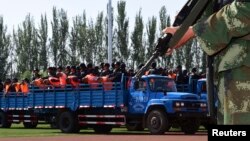China is well on the way to one of its biggest crackdowns in the restive and remote northwestern region of Xinjiang since ethnic riots racked the capital of Urumqi in 2009.
Numbers released in state-media reports and in court press releases from the region show that since May more than 800 people, most presumably members of Xinjiang's largest minority group, the Uighurs, have been taken into custody on terrorism charges.
Uighurs are a Turkic-speaking, largely Muslim minority group that have increasingly been linked by Chinese authorities to a growing number of violent attacks in China. The attacks have not only targeted government offices, but civilians as well, in Xinjiang and other parts of the country.
The crackdown began intensifying following a string of deadly attacks this spring. In the month of May more than 200 people were arrested. In the first month of China's yearlong anti-terror campaign, between late May and late June, local court press releases say 380 were arrested and 315 charged.
Figures for the second month of the campaign have yet to be released, but following a violent outburst of unrest late last month more than 230 Uighurs were taken into custody, state media reports say. During that unrest authorities say nearly 100 people died, including 59 alleged terrorists who were shot dead on site.
Some say the number of those rounded up since May could be even higher.
"Based on what we are hearing from a wide range of sources, more than 1,000 people have been arrested since May and that number is conservative figure," said Dilxat Raxit, a spokesman for the World Uyghur Congress. "The total could be even higher because there are also those who have been detained by extralegal means."
In 2009, authorities arrested more than 1,400 Uighurs after protests turned deadly and ethnic riots left nearly 200 people dead.
Fears of a Middle East Link
State media reports say authorities in Xinjiang have broken up more than 50 alleged terror groups since May. The government frequently blames the spread of religious extremism in Xinjiang on groups overseas, and increasingly there are concerns about growing links between extremists here and the Middle East.
China's Special Envoy to the Middle East, Wu Sike, recently said that Muslim extremists from Xinjiang have gone to the Middle East for training and that others may have crossed into Iraq. Chinese language media recently latched onto a speech of the proclaimed head of the Islamic State group, Abu Baki al-Baghdadi, that he made early last month.
In the address, Baghdadi raises concerns about the plight of Muslims in a long list of countries, including China.
Rafaello Pantucci, a senior research fellow at the Royal United Services Institute, said that while terrorist groups such as al-Qaida do mention Xinjiang in their declarations about the global movement, there is no clear connection yet between groups overseas and those in China.
"For example, if we look back at some of al Zahiri's recent statements he will talk about the brother organizations in the Gulf or in North Africa, or in Pakistan or in Syria, but he would never talk about in Xinjiang there being a group that they are specifically affiliated to," Pantucci said. "What they will do is to refer to this as one of the many places where Muslims have been oppressed and the Chinese government in particular is responsible for that."
Critics of the government's approach in Xinjiang such as Raxit say authorities are using the crackdown on terrorism to carry out wide-ranging oppression of Uighurs. He also says there are concerns that legal procedures are being completely ignored.
Beijing Offers Some Economic, Social Support for Region
"What we are hearing from those in the region is that the situation there now is like living in a war zone," Raxit said. "They feel no sense of justice, equality and no sense of security even in their own homes."
China Xinjiang analysts say that while the crackdown is severe, the government is reaching out at the same time to try to address longstanding concerns in the restive region such as unemployment.
Analysts say that at the same time as the crackdown intensifies, the government is also promoting policies that call for free education up to the age of 14 and bilingual teaching. The construction of a massive university in Kasghar is also seen as a key project.
Much of the violence that has wracked the region since Chinese President Xi Jinping stepped into office in March of last year, including the recent riots in Yarkand, has occurred in the south of Xinjiang, an area where a large number of Uighurs live and poverty and economic development are a key challenge.




